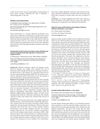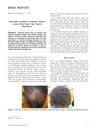 April 2023 in “Medizinische Genetik”
April 2023 in “Medizinische Genetik” New gene discoveries have improved diagnosis and treatment for skin and hair disorders, but more research is needed to fully understand them.
 2 citations,
August 2019 in “International Journal of Cosmetic Science”
2 citations,
August 2019 in “International Journal of Cosmetic Science” Older age and certain lifestyles are linked to thinner, weaker hair, while how you see your hair relates to its thickness.
 January 2024 in “Women's health science journal”
January 2024 in “Women's health science journal” Hormonal imbalances are a key cause of missed menstrual periods in women.

Fractional CO2 laser is more effective and safer than steroid injections for treating alopecia areata.
 6 citations,
September 1994 in “Veterinary Clinics of North America: Small Animal Practice”
6 citations,
September 1994 in “Veterinary Clinics of North America: Small Animal Practice” The document concludes that accurate diagnosis is crucial for effectively treating various ear diseases in dogs and cats.
 1 citations,
December 2022 in “Actas dermo-sifiliográficas/Actas dermo-sifiliográficas”
1 citations,
December 2022 in “Actas dermo-sifiliográficas/Actas dermo-sifiliográficas” Sensitive scalp causes discomfort and hair loss, treated with personalized care.
 19 citations,
September 1989 in “Journal of The American Academy of Dermatology”
19 citations,
September 1989 in “Journal of The American Academy of Dermatology” Minoxidil treatment may cause hair loss.
 3 citations,
July 1990 in “Pediatrics in Review”
3 citations,
July 1990 in “Pediatrics in Review” Most children's hair loss is due to alopecia areata, stress-related shedding, scalp fungus, or hair-pulling.
 13 citations,
December 1991 in “Annals of the New York Academy of Sciences”
13 citations,
December 1991 in “Annals of the New York Academy of Sciences” Researchers created a lab model to study human hair growth, showing it can grow and self-regulate outside the body.
 1 citations,
January 2023 in “IDCases”
1 citations,
January 2023 in “IDCases” A patient experienced severe hair loss after getting an mRNA COVID-19 vaccine.
 August 2017 in “DOAJ (DOAJ: Directory of Open Access Journals)”
August 2017 in “DOAJ (DOAJ: Directory of Open Access Journals)” Stem cell therapies show potential for treating hair loss with fewer side effects.
 6 citations,
August 2017 in “Physiological Research”
6 citations,
August 2017 in “Physiological Research” Setipiprant may reduce inflammation by blocking an enzyme called aldose reductase.
 10 citations,
May 1986 in “Experientia”
10 citations,
May 1986 in “Experientia” Too much zinc in the diet can cause hair loss and color change in young mice by reducing copper in the body.
 1 citations,
May 2023 in “Prospects in Pharmaceutical Sciences”
1 citations,
May 2023 in “Prospects in Pharmaceutical Sciences” New cytokine-targeted therapies show promise for treating alopecia areata.
 13 citations,
July 2001 in “International Journal of Dermatology”
13 citations,
July 2001 in “International Journal of Dermatology” Inflammation and Demodex mites might contribute to hair loss, and targeting them could help treat it.
 339 citations,
February 2014 in “Journal of The American Academy of Dermatology”
339 citations,
February 2014 in “Journal of The American Academy of Dermatology” Most patients with frontal fibrosing alopecia are postmenopausal women, and treatments like finasteride and dutasteride can improve or stabilize the condition.
 17 citations,
August 1979 in “Journal of The American Academy of Dermatology”
17 citations,
August 1979 in “Journal of The American Academy of Dermatology” A new staining method helps tell growing from resting hairs to diagnose hair loss.
 January 2023 in “Skin appendage disorders”
January 2023 in “Skin appendage disorders” A woman's hair grew back after treatment for a rare hair loss caused by proton therapy.
 94 citations,
January 2000 in “The Journal of Clinical Endocrinology and Metabolism”
94 citations,
January 2000 in “The Journal of Clinical Endocrinology and Metabolism” Spironolactone most effective for hirsutism, but has side effects.
 August 2018 in “Current opinion in gynecology and obstetrics”
August 2018 in “Current opinion in gynecology and obstetrics” Gynecologists should learn about transgender care to provide the best service.
 3 citations,
June 2001 in “International Journal of Cosmetic Surgery and Aesthetic Dermatology”
3 citations,
June 2001 in “International Journal of Cosmetic Surgery and Aesthetic Dermatology” Using both follicular units and slit grafts for hair transplants may give better hair density and graft survival.

CRISPR/Cas9 gene-editing shows promise for livestock breeding but faces challenges like low efficiency and off-target effects.

Men with higher body mass index (BMI) in Taiwan tend to have more severe hair loss.
 17 citations,
December 2015 in “BMC Complementary and Alternative Medicine”
17 citations,
December 2015 in “BMC Complementary and Alternative Medicine” A new plant extract from Avicennia marina could potentially be used to treat common hair loss.
 14 citations,
July 2016 in “Pediatric Dermatology”
14 citations,
July 2016 in “Pediatric Dermatology” A 9-year-old girl with alopecia areata had successful hair regrowth using bimatoprost after other treatments failed.
 December 2024 in “European Journal of Dermatology”
December 2024 in “European Journal of Dermatology” Oral minoxidil boosts hair and nail growth speed.
 11 citations,
January 1998 in “Dermatology”
11 citations,
January 1998 in “Dermatology” Spironolactone works well for acne and hirsutism, isotretinoin is very effective for acne and may have antiandrogenic effects, and 5 alpha-reductase inhibitors should be considered antiandrogens.
 March 2020 in “The Journal of animal and plant sciences/The JAPS”
March 2020 in “The Journal of animal and plant sciences/The JAPS” Aloe Vera helps wounds heal faster and promotes hair growth.
 January 2021 in “Journal of The European Academy of Dermatology and Venereology”
January 2021 in “Journal of The European Academy of Dermatology and Venereology” Men with hair loss who take a certain type of medication may experience fewer COVID-19 symptoms.
 2 citations,
March 2020 in “International Journal of Molecular Sciences”
2 citations,
March 2020 in “International Journal of Molecular Sciences” Topical treatments can deliver active molecules to skin stem cells, potentially helping treat skin and hair disorders, including skin cancers and hair loss.






























